
The Qu'Appelle River is a river in the Canadian provinces of Saskatchewan and Manitoba that flows 430 kilometres (270 mi) east from Lake Diefenbaker in south-western Saskatchewan to join the Assiniboine River in Manitoba, just south of Lake of the Prairies, near the village of St. Lazare. It is located in a region called the Prairie Pothole Region of North America, which extends throughout three Canadian provinces and five U.S. states. It is also within Palliser's Triangle and the Great Plains ecoregion.

Indian Head is a town in southeast Saskatchewan, Canada, 69 kilometres (43 mi) east of Regina on the Trans-Canada Highway. It "had its beginnings in 1882 as the first settlers, mainly of Scottish origin, pushed into the area in advance of the railroad, most traveling by ox-cart from Brandon." "Indian" refers to Aboriginal Canadians. The town is known for its federally operated experimental farm and tree nursery, which has produced and distributed seedlings for shelter belts since 1901. For many years the program was run by the Prairie Farm Rehabilitation Administration (PFRA).
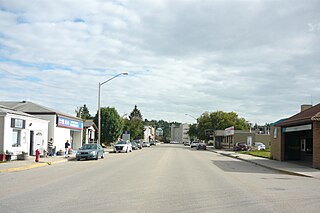
Lumsden is a town in the Qu'Appelle Valley in south central Saskatchewan, Canada, 31 km northwest of the city of Regina. It is surrounded by the Rural Municipality of Lumsden No. 189. The town functions as both a farming community and an unofficial suburb of Regina. Lumsden has an active artistic community, which consists of many writers, painters and sculptors.

Fort Qu'Appelle is a town in Canadian province of Saskatchewan located in the Qu'Appelle River valley 70 km (43 mi) north-east of Regina, between Echo and Mission Lakes of the Fishing Lakes. It is not to be confused with the once-significant nearby town of Qu'Appelle. It was originally established in 1864 as a Hudson's Bay Company trading post. Fort Qu'Appelle, with its 1,919 residents in 2006, is at the junction of Highway 35, Highway 10, Highway 22, Highway 56, and Highway 215. The 1897 Hudson's Bay Company store, 1911 Grand Trunk Pacific Railway station, Fort Qu'Appelle Sanatorium, and the Treaty 4 Governance Centre in the shape of a teepee are all landmarks of this community. Additionally, the Noel Pinay sculpture of a man praying commemorates a burial ground, is a life-sized statue in a park beside Segwun Avenue.
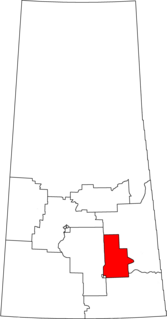
Regina–Qu'Appelle is a federal electoral district in Saskatchewan, Canada, that has been represented in the House of Commons of Canada from 1904 to 1968 and since 1988.
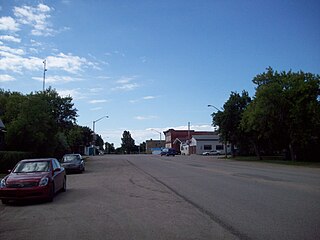
Qu'Appelle is a town in Saskatchewan, located on Highway 35 approximately 50 km (31 mi) east of the provincial capital of Regina.
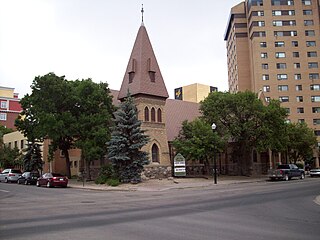
St Paul's Anglican Cathedral is an historic church building located on the outskirts of Regina's central business district. Built as a parish church in 1894–1895, it became the pro-cathedral of the Anglican Diocese of Qu'Appelle in southern Saskatchewan, Canada, in 1944 when pro-cathedral status was removed from St Peter's, Qu'Appelle, in the eponymous former see city which had become moribund. In 1973, when it had become clear that the once-planned grand cathedral for Regina — at the corner of Broad Street and College Avenue — was no longer a feasible project, its status was raised to that of cathedral.
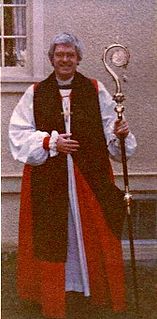
Michael Geoffrey Peers was Primate of the Anglican Church of Canada from 1986 to 2004.
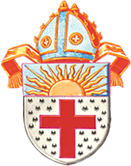
The Diocese of Qu'Appelle in the Anglican Church of Canada lies in the southern third of the civil province of Saskatchewan and contains within its geographical boundaries some 50 per cent of the province's population of one million.

The Fishing Lakes, also known as Qu'Appelle and Calling Lakes, are a chain of four lakes in the Qu'Appelle Valley cottage country about 40 miles (64 km) to the north-east of Regina in the Canadian province of Saskatchewan. The lakes are in a region called the Prairie Pothole Region of North America, which extends throughout three Canadian provinces and five U.S. states. It is also within Palliser's Triangle and the Great Plains ecoregion. The Fishing Lakes all follow the course of the Qu'Appelle River, which flows from the west to the east and is part of the Hudson Bay drainage basin. The lakes sit in the deep-cut Qu'Appelle Valley that was formed about 14,000 years ago during the last ice age. Meltwater from the glaciers carved out the valley and as water levels rose and fell, alluvium was left in the wake. These piles of alluvium are what created the separations between the lakes.

Lebret is a village in the Canadian province of Saskatchewan within the Rural Municipality of North Qu'Appelle No. 187 and Census Division No. 6. The village is situated on Mission Lake of the Fishing Lakes in the Qu'Appelle Valley. Lebret is located along Highway 56, about 70 km (43 mi) northeast of the City of Regina. The village was named after "the parish priest, Father Louis Lebret, who became the first postmaster of the community and, although he only held the position for a little more than six months, the office was named Lebret and the name became that of the community."

Adelbert John Robert Anson DD was a clergyman from the Anson family. He served as an Anglican bishop in late 19th century western Canada.

William John Burn was an Anglican colonial bishop in the late 19th century.
John Grisdale was an Anglican colonial bishop in the late 19th century.
Edwin Hubert Knowles was an Anglican bishop in the second quarter of the 20th century.
George Fredric Clarence Jackson was an Anglican bishop in the second half of the 20th century.
Eric Bays is a retired Anglican bishop.
Duncan Douglas Wallace was the 10th Bishop of Qu'Appelle in the Anglican Church of Canada.
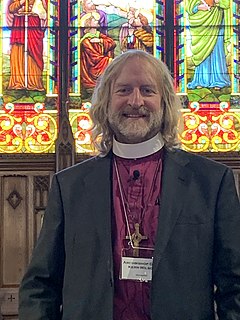
Gregory Kerr-Wilson is a bishop of the Anglican Church of Canada. He is the current Archbishop of Calgary.
Robert Hardwick is a retired bishop of the Anglican Church of Canada. He served as the 12th Bishop of the Diocese of Qu'Appelle, which covers much of the southern part of the Canadian province of Saskatchewan. Originally from England, he and his family moved to Canada in 2001, where he became parish priest at St Stephen the Martyr, Swift Current, Saskatchewan. In 2008 he was appointed executive archdeacon for the diocese and in 2012 he was elected Bishop of Qu'Appelle at an electoral synod. He retired in 2021.













